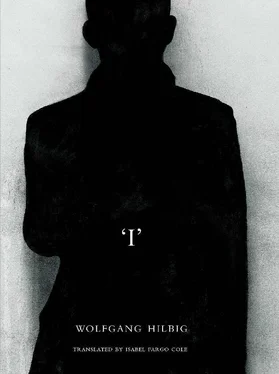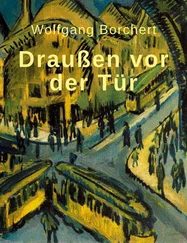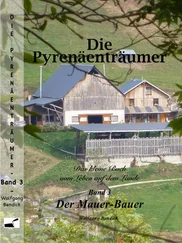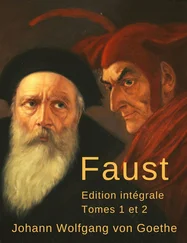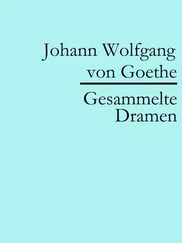Wolfgang Hilbig - 'I'
Здесь есть возможность читать онлайн «Wolfgang Hilbig - 'I'» весь текст электронной книги совершенно бесплатно (целиком полную версию без сокращений). В некоторых случаях можно слушать аудио, скачать через торрент в формате fb2 и присутствует краткое содержание. Год выпуска: 2015, Издательство: Seagull Books, Жанр: Современная проза, на английском языке. Описание произведения, (предисловие) а так же отзывы посетителей доступны на портале библиотеки ЛибКат.
- Название:'I'
- Автор:
- Издательство:Seagull Books
- Жанр:
- Год:2015
- ISBN:нет данных
- Рейтинг книги:4 / 5. Голосов: 1
-
Избранное:Добавить в избранное
- Отзывы:
-
Ваша оценка:
- 80
- 1
- 2
- 3
- 4
- 5
'I': краткое содержание, описание и аннотация
Предлагаем к чтению аннотацию, описание, краткое содержание или предисловие (зависит от того, что написал сам автор книги «'I'»). Если вы не нашли необходимую информацию о книге — напишите в комментариях, мы постараемся отыскать её.
introduces us to W, a mere hanger-on in East Berlin’s postmodern underground literary scene. All is not as it appears, though, as W is actually a Stasi informant who reports to the mercurial David Bowie lookalike, Major Feuerbach. But are political secrets all that W is seeking in the underground labyrinth of Berlin? In fact, what W really desires are his own lost memories, the self undone by surveillance: his ‘I.’
First published in Germany in 1993 and hailed as an instant classic,
is a black comedy about state power and the seductions of surveillance. Its penetrating vision seems especially relevant today in our world of cameras on every train, bus, and corner. This is an engrossing read, available now for the first time in English.
“[Hilbig writes as] Edgar Allan Poe could have written if he had been born in Communist East Germany.”—
'I' — читать онлайн бесплатно полную книгу (весь текст) целиком
Ниже представлен текст книги, разбитый по страницам. Система сохранения места последней прочитанной страницы, позволяет с удобством читать онлайн бесплатно книгу «'I'», без необходимости каждый раз заново искать на чём Вы остановились. Поставьте закладку, и сможете в любой момент перейти на страницу, на которой закончили чтение.
Интервал:
Закладка:
And W. ended up telling his drinking buddy about the existence — at least the erstwhile existence — of tunnels on the edge of town. . he’d only done it, he reproached himself later, so as to appear to Cindy in the right light. . and Harry didn’t seem to find this story at all improbable. . Were the tunnels still there? he immediately wanted to know.
On Harry’s urging they had headed there that very night; the terrain had long since been cleared and levelled, only on the edge of the forest, where they weren’t in the way, had piles of rubble and a few remnants of walls remained, swallowed almost wholly by the outspreading underbrush, you could hardly see a thing in the damply breaking dawn, with the fog creeping from the forest. — Drunk as he was, Harry had suddenly slipped and slid down the grass and fallen leaves of a peculiar hollow, caught at the bottom by a bank of mud, gravel and shrubbery. He was lying next to one of the tunnel system’s almost-buried exits. Only a narrow chink still indicated the opening in the vertical fragment of a wall overhung by a tangle of brambles. .)
Brought to Light
When the train at Warschauer Strasse finally started moving, I was wide awake. ‘Stand back’ came the barely intelligible snarl, though there was no one on the platform; the bell shrilled and, as the red lights over the doors went out, a dull jolt travelled down the row of cars, the closed doors locking into place; first haltingly, then gaining speed, the train began to roll. I’d been asleep; despite my damp clothes, clammy on my skin, my sitting position (prenatal, I’d once called it) irresistibly induced sleep. It was a sleep that took practice: it kept my thoughts in full swing, or even seemed to increase their intensity, as they lacked all grounding in temporal relationships. I sat against the back wall of the empty car, squeezed into a corner, feet tucked up against the radiator under the seat, which sent up waves of warmth that seemed mingled with steam; I’d jammed my fists in my lap, and the back of my head, resting on the wall, picked up the trembling vibrations of the train’s motion.
My thoughts shut out time, and so could not quite be called memories, veering without transition between spaces in time (you could no longer call them spaces of time). . I dispelled my fear that I’d see light in my flat from the street, and would have to go straight to the basement without changing my wet clothes, by reminding myself that I’d run into the Major on Alexanderplatz just a short time ago. . of course he could have overtaken me, maybe he’d had a car parked nearby, I had no idea how long I’d slept in the train. As always when I came in from the rain, my watch had stopped, it couldn’t cope with the damp which the radiator warmth released from the clothes I’d worn too long, nor, apparently, with the sweat I worked up on my way from the basement to the fifth floor; it could only cope when I rested, when my blood pressure dropped, it ran best in subterranean spaces, or lying atop my heating stove as it cooled off overnight. . as though then reapproximating the temperature of its former owner: Harry Falbe’s frosty girlfriend Cindy. With her knowledge it had been given to me at one time for safekeeping; when one of Cindy’s prison stays ended, she had forgotten about the watch. . it would have a certain role to play later on, a primitive men’s watch of considerable size, the sort fashionable with a certain type of young woman several years before, that bellicose time when razorblades and carpet tacks had found their way into the jewellery shops. — One day — it was at the Whitsun holiday, presumably last year — a watch which readily stood my body’s basement effluvia had been placed in my hands by the Firm. . no, not in my hands; I’d found a note summoning me to Feuerbach’s office; the Major wasn’t there, the watch lay on his desk in a plastic case, next to it the certificate with the Firm’s heraldic emblem, and next to that a note in Feuerbach’s handwriting: Dear Cambert, this is for you, congratulations! Destroy the certificate immediately.
(W. had kept the certificate, folded over and over again and well hidden. Alongside other pre-printed, illegible signatures it had been signed by a Colonel Reuther, MSS Sect. 20, Berlin, the?? of??)
Upon leaving the office I had already forgotten the date; that was even safer than destroying the certificate. . on the stairs I met Feuerbach, who slipped me an envelope with money. — We’ll have to sign receipts again one of these days, he said, you haven’t signed anything for quite a while. As if you had a problem with signatures. . maybe tomorrow in the cafe, if that’s OK with you.
When I signed receipts — always a whole stack at once, accumulated over the months. . and I signed with my code name, which at first the Major didn’t like at all. . when he finally accepted it I asked him: What’s my pseudonym now, I ought to have got a new one ages ago. . on a regular basis I completely lost track of whether all the expenses I’d had and for which I wrote receipts had actually been reimbursed — sometimes there seemed to be too many, sometimes too few — and the signing in itself made me uncomfortable, I saw how it documented and immortalized me, archiving me, as it were, and making me manifest for the historical research of future morality paranoiacs. — Feuerbach took a very different view: You’ll never be able to get any real accolades because you don’t even crop up in our annals. And I’ll go empty-handed, too, because they’ll tell me I just invented my comrade-in-arms. — He shuffled the receipts together: All right , he said in English. . unfortunately that’s how it has to be. With us it’s like in a novel — at some point you have to figure out what the main character actually does for a living!
(But he planned not to use the new watch, a mid-priced Japanese model, until he was allowed to travel for the first time; it was much more suitable for another part of the city where time mattered. And he pictured himself arriving and pushing back his sleeve over the watch on his left lower arm to look at the hair-thin chrome-plated hands. . that was important for his first report, which would have to begin thus: Border crossing ensued, date:. ., place: Berlin Friedrichstrasse West, Wannsee-bound S-Bahn platform, time: 0.35 CET; cigarettes purchased at Intershop kiosk, one carton Lexington brand, target person lost in the crowd.
He’d dispense with the signature — maybe they’d give him a number. Feuerbach could countersign himself, if he liked, when the reports reached his office by post.
And perhaps one day he’d become M. W. again. . it might take a long time — perhaps his lapsing attention would give the first sign of it: for several minutes he’d forgotten the target person completely in his effort to find his way around this train station.)
How childish were all these reports in their obsessive quest for linguistic precision; there was no form for them, since guidelines for their composition could not officially exist, at least not on paper; their form was left to the bureaucratic side of each individual employee. . and how unimaginative these reports were — yet you could give free rein to your imagination once the border crossing had ensued. . or so I pictured it.
Many a time I’d left Friedrichstrasse Station through the side exit and watched the lines of people outside the border checkpoint: there were more and more people each time — also more and more natives, too, and not just pensioners, either10—waiting outside the gateway. . in fact, the line in front of the sign Departing Citizens of the German Democratic Republic was almost longer than the one for West Berlin day-trippers. — For me the only option was the so-called diplomatic checkpoint, since employees of the Firm could obtain a visa for official business, and so I went through in the middle, between the other two groups; for me there was no wait to speak of. Nowhere in this Republic were queues as patient as at the border checkpoint. . and yet — you could virtually smell it — it was a forced patience, a patience of prudence, with feet of clay. And so I had to walk past the waiting people, quickly leaving behind the gigantic reptile which wound its way in disciplined rows of three all the way to the station square. . I didn’t want to know what went through these people’s minds when they saw me. They didn’t even look at me, but I sensed that in their eyes I was one of those they had to thank for their ordeal. Was there anger in them, was I already registered in their eyes. . it was impossible to tell, their faces let nothing on. — My crossing went quickly, who knows which tiny symbol in my passport had this effect, which invisible mark, legible only to an X-ray machine or a computer, instructed the official to let me through at any cost, without any delay. Then the cubical caverns of the concrete labyrinth beneath the train station, through which hounded, enslaved people scrabbled their way, the bare catacombs meant for other things, several walls still faced with white — yellow tiles from a time completely banished from reality: the tiles of intact station underpasses. . everywhere unlabelled steel doors, everywhere the double sentries of the border police. . then, at an iron barrier, one more check, just a fleeting glance at the stamp in the document, then the ticket machines where people stood at a loss, lacking small change — they meant nothing to me, I’d heard I didn’t need a ticket, as a citizen of the German Democratic Republic . . then up the broad grey stone stairs to the platform, somewhere on the wall an advertising poster for the Berliner Ensemble , with admission times, with prices in DM, aimed at the visitors from West Berlin. . at this time of night the crowds move up the stairs at a crawl; then the platform — this isn’t West Berlin yet, but I’m out; the Intershop kiosk doesn’t take Forum cheques now, just Western money. — The East German border guards (use this term from now on!) are still patrolling everywhere, and standing up on a scaffold beneath the glass roof of the station hall, armed with binoculars and submachine guns, and probably there are even more plainclothes men here, ensuring that order is kept. . could they come and snatch you back even here? They could, certainly, but they’d avoid such a scene at all costs. Here they’re nothing but a presence, the border troops, furnishings of the station’s permanent state of emergency. — I must make sure to keep my eye on the target person, I must keep my eye on her in such a way that she doesn’t catch sight of me, maybe she’d recognize me after all. But at this hour observation is easy, at this hour the platform is brimful with people whose day visas have just expired (lately, incidentally, one overnight stay is permitted) — they left the country half an hour before midnight, and half an hour after midnight they’ll enter the country again, when the new day according to CET permits the next-day visa (lately for two days, for lovers), and the next payment of the fee and exchange of the minimum daily sum of currency. — You weren’t really in West Berlin until Lehrter Stadtbahnhof, and you had to restrain yourself from getting out here, in this desolate part of the city. . though maybe even here, by the Wall, there were still a few pubs open (in the front city of the Western world, with no bar curfew). . Bellevue and Tiergarten weren’t it yet either: the goal was Zoo Station. . meanwhile the target trundled on towards Charlottenburg or Grunewald. Actually, you weren’t really and truly out until you were sitting in the Bistro at Zoo Station; even the Pressecafe, that much-frequented, multilingual halfway pub, didn’t do the trick. . to really be in the West. . to really be no one but M. W.
Читать дальшеИнтервал:
Закладка:
Похожие книги на «'I'»
Представляем Вашему вниманию похожие книги на «'I'» списком для выбора. Мы отобрали схожую по названию и смыслу литературу в надежде предоставить читателям больше вариантов отыскать новые, интересные, ещё непрочитанные произведения.
Обсуждение, отзывы о книге «'I'» и просто собственные мнения читателей. Оставьте ваши комментарии, напишите, что Вы думаете о произведении, его смысле или главных героях. Укажите что конкретно понравилось, а что нет, и почему Вы так считаете.
